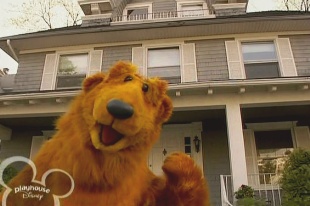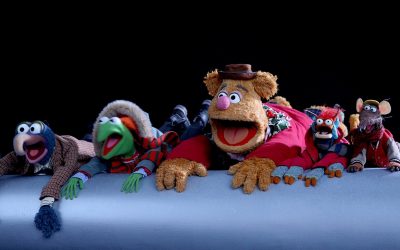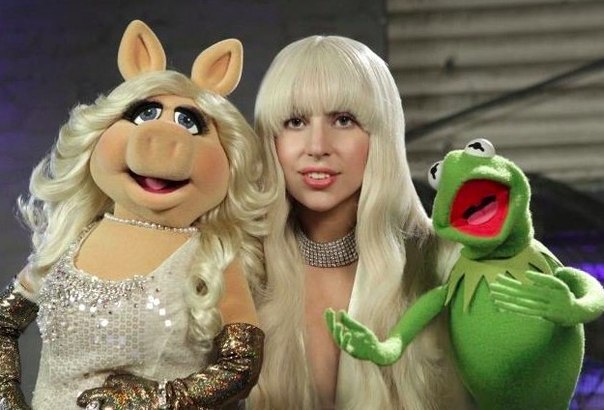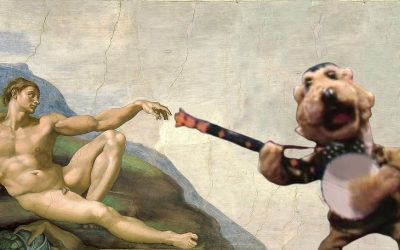Monday Tuesday Wednesday Thursday Friday
 We’re up to the third episode, and Bear is ready to put it all out there. There are no secrets between us anymore. “Good morning!” he says. “I’m here to visit my good friend Rhea. We have lots planned this morning. I think we’ll do the Morning Mambo — I love that dance! — and then we should have a really good breakfast, to help us get energy for the rest of the day. Oh! And then Rhea has to get ready for school! I wonder how she does that? Hmmm, I’m curious.” Yeah, well, I guess doing the exact same thing yesterday and the day before didn’t quite scratch that curious itch for you, Bear, so I have my doubts that today is going to be the day that it all comes together for you.
We’re up to the third episode, and Bear is ready to put it all out there. There are no secrets between us anymore. “Good morning!” he says. “I’m here to visit my good friend Rhea. We have lots planned this morning. I think we’ll do the Morning Mambo — I love that dance! — and then we should have a really good breakfast, to help us get energy for the rest of the day. Oh! And then Rhea has to get ready for school! I wonder how she does that? Hmmm, I’m curious.” Yeah, well, I guess doing the exact same thing yesterday and the day before didn’t quite scratch that curious itch for you, Bear, so I have my doubts that today is going to be the day that it all comes together for you.
The TV producers’ pedagogical theory is that young kids really like repetition, because they’re more comfortable watching a show if they know exactly what to expect. And that’s a really convenient pedagogical theory to have, if you don’t want to spend a lot of money on writers. The inescapable logic of reality shows has now hit preschool TV in a big way — kids can learn by watching other kids, plus we don’t have to pay puppeteers. At some point, the same logic will be applied to elementary schools, and then we won’t have to pay teachers, either.
 I don’t have a problem with this; I think watching reality shows engages children’s critical thinking skills, and their capacity for sarcasm. Breakfast with Bear is like the kids’ starter pack for Queer Eye and Trading Spaces, where the show is the same every episode, and you just tune in to see the split ends and the track lighting. I imagine us breeding a nation of pint-size Carson Kressleys. Oooh, they wince — watching Breakfast with Bear as they reorganize their action figures by color — get her.
I don’t have a problem with this; I think watching reality shows engages children’s critical thinking skills, and their capacity for sarcasm. Breakfast with Bear is like the kids’ starter pack for Queer Eye and Trading Spaces, where the show is the same every episode, and you just tune in to see the split ends and the track lighting. I imagine us breeding a nation of pint-size Carson Kressleys. Oooh, they wince — watching Breakfast with Bear as they reorganize their action figures by color — get her.
So Bear greets Rhea in what we’re supposed to believe is her bedroom, but it must be some kind of camera trick, because no child’s bedroom looks like this. Everything in it is white. The walls are cream colored. The bedspread is white and pale blue. The dressers are white. The carpet is light beige. There are four little pictures on the walls, each one immaculately framed. This room is not inhabited by a child.
That feeling gets even stronger as you watch Bear and Rhea interact. Bear walks in, and Rhea yells, “Bear!” as she hugs him. “Hello, Rhea!” he says. “How are you?” Rhea says, “Good.” And that’s about all she has to say. The rest of the conversation goes like this.
Bear: “Good morning!”
Rhea: (smiles)
Bear: “Thanks for having me come by!”
Rhea: (smiles)
Bear: “I can’t wait to spend the morning with you!”
Rhea: (smiles)
Bear: “… So. Did you have a good night’s sleep?”
Rhea: (nods)
 And there you have it, that’s the next hour of Bear’s life. Rhea says one more word in this opening segment — “Stretch” — and that’s all. In the whole twelve and a half minute show today, Rhea says 57 words total. That’s approximately the number of words Aaron said in every sentence. Rhea is the anti-Aaron.
And there you have it, that’s the next hour of Bear’s life. Rhea says one more word in this opening segment — “Stretch” — and that’s all. In the whole twelve and a half minute show today, Rhea says 57 words total. That’s approximately the number of words Aaron said in every sentence. Rhea is the anti-Aaron.
So I’m sitting here, thinking, what on earth is the matter with people in the suburbs, and then the camera pans over to Rhea’s bed, and I notice that there are seven stuffed animals on the bed, and all of them are white. And I realize that there is something terribly, terribly wrong going on in this house.
Because you know what that means, right? The picture of Rhea’s childhood clicks into sharp focus. Rhea’s at the toy store, and she’s hugging a toy bunny, and it’s soft and pretty, and it’s her new best friend. And Rhea’s mom gently takes it from her arms and says, No, honey, remember? We only buy stuffed animals that match your bedspread. And then she puts the bunny back on the shelf.
 The rest of the show is essentially a case study. There are three times when Rhea says more than five words at once, and those three sentences are: “Usually, I’m kind of all pink,” “I think I need a sweater,” and “For safety, in case you fall on your head.” At breakfast, Rhea puts twelve blueberries in her granola, which she counts out one by one. During the “get ready for school” segment, Bear says, “I hear that you’re a great maker of the bed,” which means that the producers asked her mom what Rhea did well, and they were told that Rhea’s special talent is making the bed.
The rest of the show is essentially a case study. There are three times when Rhea says more than five words at once, and those three sentences are: “Usually, I’m kind of all pink,” “I think I need a sweater,” and “For safety, in case you fall on your head.” At breakfast, Rhea puts twelve blueberries in her granola, which she counts out one by one. During the “get ready for school” segment, Bear says, “I hear that you’re a great maker of the bed,” which means that the producers asked her mom what Rhea did well, and they were told that Rhea’s special talent is making the bed.
Best of all, we see Rhea’s mom twice — once at breakfast, and again when Rhea leaves for school — and Rhea does not speak to her mother or make eye contact at any time. I think it’s pretty obvious what’s going on here. Rhea is a desperate housechild.
So I never thought I’d say this, but it looks to me like what Rhea needs is a nice set of Disney Princess dolls, and maybe a cape. Can’t we do something about this?



